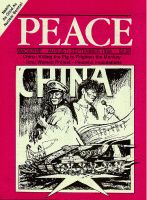
Peace Magazine Aug-Sep 1989, page 4. Some rights reserved.
Search for other articles by PMag staff here
THERE'S A television set beside this computer which, during the last weeks of May and early June, was kept on 24 hours a day, tuned to the extraordinary drama in Beijing. For a while it seemed so promising!
Whatever is shown on television is imitated by someone, as the Rambo killings show. Too rarely are cases of nonviolent struggle broadcast. The vast audience watching Tiananmen Square had an uncommon chance to learn.
Just before the Marcos regime was overcome, Fellowship of Reconciliation sent a team to Manila, providing the vital training that banished that dictator. The disappointing timidity of Aquino's government does not make the preceding nonviolent revolution any less remarkable.)
In Poland a couple of years later we spoke with a priest who was planning Solidarnosc's next campaign. He said, "I hadn't expected it to be nonviolent again next time, but now I think it will be. The young people in my parish were so impressed with the tactics used in the Philippines!"
And so, it seems, were the young people in China. Having watched the victory of nonviolence in Poland and the Philippines, they emulated it, and in their turn were watched by millions. Nonviolence is spreading, thanks to TV.
And, also thanks to TV, commitment to human rights is also spreading. Five years ago, many peace activists claimed that disarmament and peace could be pursued without regard to liberty or justice. No longer so! The massacre reminded us of the inescapable relationship of security, nonviolence, and human rights. We cannot pursue peace without also defending victims of oppression. Indeed, our own previous obliviousness may one of the causes of the Beijing atrocities. After all, Westerners had barely objected to years of bloodbath in Tibet; we could reasonably be expected to tolerate a smaller massacre in Beijing.

Peace Magazine Aug-Sep 1989, page 4. Some rights reserved.
Search for other articles by PMag staff here